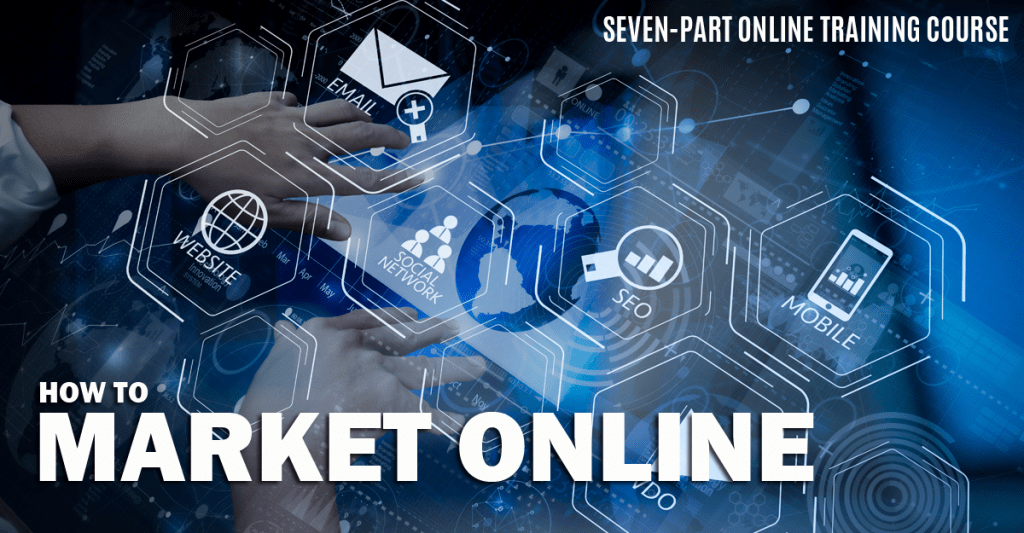The COVID-19 coronavirus has brought a whole new focus on marketing online, as consumers retreat into their bubbles, whether through self-imposed isolation or by government mandate.
As we slowly move out of lockdown, more and more NZ businesses will need to sell and market online, to maintain social isolation (and because, during the lockdown, an increasing number of Kiwi consumers have been sampling online shopping for the first time and have enjoyed the experience).
Around half of New Zealand small businesses are unfamiliar with what it takes to market effectively online. To help out in these troubled times, we at Netmarketing Courses have drawn from a number of our online training courses to put together a helpful seven part training course to help New Zealand businesses to quickly establish themselves online and start marketing to Kiwi audiences.
Here is what you need to know about our new HOW TO MARKET ONLINE course:
Lesson 1: Optimise your Google My Business page.
This is the single most important step you should take if you are a local business. By filling in the key information on your Google My Business page, you will be telling Google what it needs to know to list your business effectively online. That will improve your search visibility, ensure your business is accurately represented on Google Maps, display more useful information on search pages (such as hours of operation and a full description of the business) and add a Call button to your Google listing for mobile users.
In this lesson, we cover:
- the vital importance of Google My Business
- which businesses qualify (and which businesses don’t)
- step-by-step instruction to set up your Google My Business page
- information that is not permitted (and could result in your listing being suspended)
- setting up a consistent name address and phone number across the web
- choosing relevant business categories
- the types of photos you should add to your business listing
- how to verify your business details
- how to optimise your Google My Business page
Lesson 2: Optimise your business website.
84% of consumers believe that small businesses with websites are more credible than those without an online presence. If you do have a website, but it isn’t much more than an online brochure, now is the time to bring it to life. How? Take some time to brainstorm what would be most useful to your customers and clients in the current environment, write articles featuring appropriate, relevant content and add those articles to your website.
This lesson covers:
- why your business needs a website
- how to claim your online identity
- planning your website
- setting website goals
- how to outsource the building of your website; or
- how to build your website yourself
Lesson 3: Reach out to your existing customers.
If you already have an email list or a messenger list of customers, communicate with them regularly via email or messaging. Yes, you can provide them with limited information about your own services (especially if you are deemed an essential service) but primarily you should be providing helpful advice and reassurance during this time. This is not a time for self-promotion but rather a time to help.
In Lesson Three, we discuss:
- why email marketing still works so well
- the three different types of email strategies
- how marketers segment and personalise their email lists
- five ways to succeed at email marketing
- how best to communicate to your list
- email marketing mistakes to avoid
- best practice marketing emails
- the key elements of an effective email programme
- MESSAGING
- the growing importance of messaging apps
- key factors to note
- which messaging apps you should use
- best uses of messaging apps
- most appropriate content to distribute via messaging
We also cover the NZ Unsolicited Electronic Messages Act and why it matters to both email marketers and those who would use messaging
Lesson 4: Optimise your website for search.
These days, search engines such as Google and Bing scan websites looking for content and phrases that match the more conversational intentions of their users. Your website copy should evolve accordingly, seeking to answer common search queries.
This lesson covers:
- the statistics that reflect the importance of search engines
- the importance of ranking on the first page of search results
- the most important factors that Google takes into account when ranking search results
- how to choose the right keywords
- the most valuable headlines for your website pages
- understanding your audience and its intentions
- how you can multiply the effectiveness of your website through structured data markups
- establishing and growing your expertise, authority, and trustworthiness
- what you need to know about micro-moments
- the benefits and perils of featured snippets
Lesson 5: Mingle in social media.
Social media usage has increased as a direct result of COVID-19. In Europe, for example, Facebook usage has grown by 11.9%. Social media is where your customers are gathering and that’s where you should be as well. If your primary customers are under 35, Instagram should be your medium of choice. Otherwise, Facebook is home to more than 2.5 million monthly Kiwi users of all ages.
In Lesson Five, we explore:
- why marketers are devoting so much attention to social media
- which social media are most significant for your business
- the biggest challenges facing social media marketers
- problems to avoid
- how to use Facebook effectively
- the most effective Instagram strategies
- when you should consider other social media networks
Lesson 6: Stop selling and start giving.
If there is an overriding theme to this course, it’s this: stop pitching your products and focus on helping people. That’s a good plan at any time, but more especially so in the current environment. You will gain far more respect and authority by adding value than by trying to squeeze a few extra dollars out of your audience. Whatever you create, ask yourself this simple question: is it helpful?
In this lesson, we cover:
- online monitoring and why it is so essential
- five simple monitoring strategies that you can implement immediately
- how to better understand your target audience
- what you should talk about in your online content
- developing an effective content calendar
Lesson 7: Distribute widely.
Once you have created each piece of content, consider how you might distribute it more widely (not just through your website).
Lesson Seven recommends:
- transforming your content into different formats (e.g. a video, slideshow, press release, white paper, infographic, podcast)
- where to distribute your content — social media, trade websites, press release sites, video sites such as YouTube or Vimeo, Slideshare?
- how to get seen and noticed
- avoiding the seven deadly sins of content marketing
————————
TIMING
The How to Market Online training course begins on Thursday 26 February, 2026.
————————
INVESTMENT
This seven-part online training course is available for $497+GST. However we offer an Early Bird Discount of $100 for bookings received and payment made by midnight on Thursday 19 February, 2026.
Bookings are confirmed on receipt of payment, which can be by bank deposit or credit card. We can raise an invoice in advance if you need it.
To reserve your place in this course, please pay $397+GST by credit card through PayPal by clicking here:
https://www.paypal.com/cgi-bin/webscr?cmd=_s-xclick&hosted_button_id=2R6JDSG569DUN
If you would prefer to pay by bank deposit, or require an invoice, please send an email to bookings@socialmedia.org.nz with your requirements.
WHAT HAPPENS NEXT?
You’ll receive our emailed confirmation of your booking. Then we’ll follow up with details of your Login and Password, along with an Enrolment Key for the How to Market Online online training course.
If you have any questions, or would like more information, please email us at bookings@socialmedia.org.nz.
ABOUT US
The course has been created by Michael Carney, longtime marketer and author of several books, including the top-selling book “Trade Me Success Secrets” (now in its Second Edition) which tells how to sell effectively on this country’s largest and most successful eCommerce platform. Michael is also the creator of a number of other online courses (including several Social Media Marketing courses) and consults on many digital business initiatives.
This is an online course, conducted on a web-based e-learning software platform, enabling course participants to proceed at their own pace, accessing materials online. This particular eCourse provides content in a variety of multimedia forms, including videos, slideshows and PDF files. No special software is required to participate.
Course lessons will be provided in seven parts, for participants to access in accordance with their own timetables.
CUSTOMER FEEDBACK
Here’s what some of our students have said about our other courses:
- Really informative course, definitely helping us whilst we start out on our first ecomm project in NZ — Rob. T
- Thanks for another great course. I found it insightful, in-depth and I know our web presence and web sales will improve because of it. — Bruce H.
- I have somehow managed to develop over 80 pages of my own notes to complement the course ones. I look forward to participating in another in the near future. — Mark J

